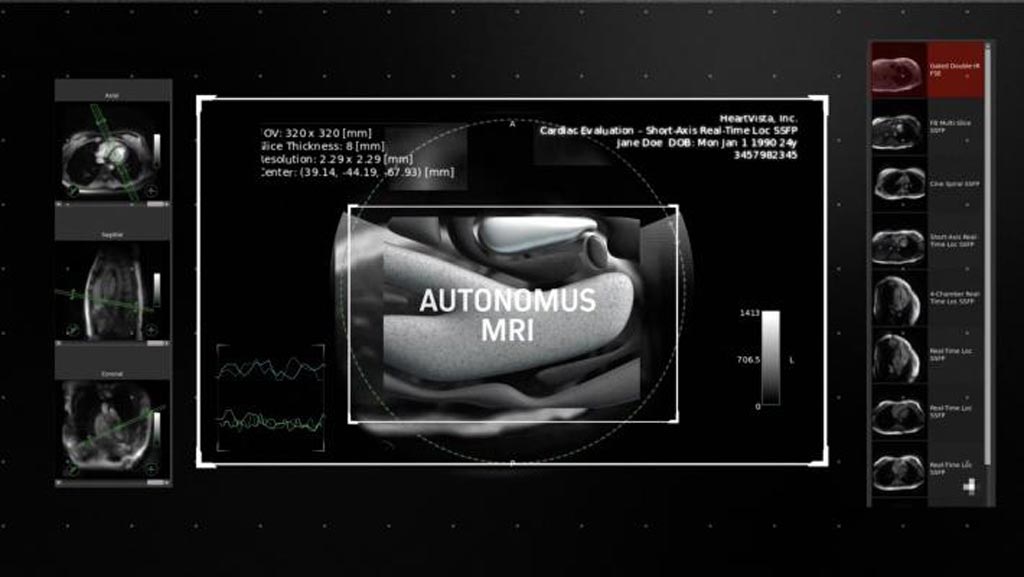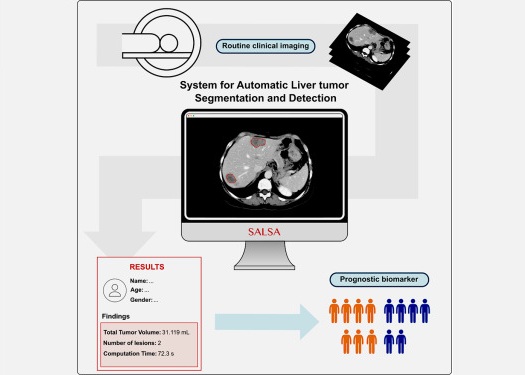Autonomous MRI Solution Enables More Efficient Scans
|
By MedImaging International staff writers Posted on 10 Dec 2018 |

Image: An AI-driven solution facilitates cardiac MRI scans (Photo courtesy of HeartVista).
A novel artificial intelligence (AI) platform integrates with existing magnetic resonance imaging (MRI) scanners to enable a complete and comprehensive cardiac ischemia exam in less than 15 minutes.
The HeartVista (Los Altos, CA, USA) One-Click MRI acquisition software is designed to automatically acquire standard cardiac views in as little as 10 seconds, all while the patient breathes freely. An artifact detection algorithm incorporated into the autonomous protocol senses if the image quality is below an acceptable range, prompting the operator to reacquire them. An accelerated non-cartesian four-dimensional (4D) cardiac flow sequence can thus be acquired in just minutes, allowing necessary calibrations prior to the myocardial delayed-enhancement acquisition.
The AI-driven solution breaks down barriers for wider adoption of cardiac MRI exams. Patients benefit from fewer breath holds and reduced discomfort, and also enjoy increased access to imaging, especially those suffering from arrhythmia, intolerance to long exams, and other health constraints. Technologists benefit from the reduced complexity of exams, while clinicians can simultaneously remotely monitor and guide the exams and review scans acquired with consistency and confidence, including preliminary measurements of left ventricular function.
“We are thrilled to introduce the first autonomous MRI solution that incorporates years of innovation and collaboration with world-class clinicians, technologists and researchers across major institutions,” said William Overall, founder and CTO of HeartVista. “Magnetic resonance imaging offers one of the richest diagnostic imaging techniques today and our mission is to enable fast, efficient and simple MRI exams so patients, providers, and radiologists can all benefit.”
Cardiac MRI is an imaging technology for the non-invasive assessment of the function and structure of the cardiovascular system based on the same basic principles as magnetic resonance imaging (MRI), with optimizations that use rapid imaging sequences. As a result, CMR images are currently acquired in steps. Patients breathe in and then hold their breath for each image, then recover before repeating the process for the next image.
Related Links:
HeartVista
The HeartVista (Los Altos, CA, USA) One-Click MRI acquisition software is designed to automatically acquire standard cardiac views in as little as 10 seconds, all while the patient breathes freely. An artifact detection algorithm incorporated into the autonomous protocol senses if the image quality is below an acceptable range, prompting the operator to reacquire them. An accelerated non-cartesian four-dimensional (4D) cardiac flow sequence can thus be acquired in just minutes, allowing necessary calibrations prior to the myocardial delayed-enhancement acquisition.
The AI-driven solution breaks down barriers for wider adoption of cardiac MRI exams. Patients benefit from fewer breath holds and reduced discomfort, and also enjoy increased access to imaging, especially those suffering from arrhythmia, intolerance to long exams, and other health constraints. Technologists benefit from the reduced complexity of exams, while clinicians can simultaneously remotely monitor and guide the exams and review scans acquired with consistency and confidence, including preliminary measurements of left ventricular function.
“We are thrilled to introduce the first autonomous MRI solution that incorporates years of innovation and collaboration with world-class clinicians, technologists and researchers across major institutions,” said William Overall, founder and CTO of HeartVista. “Magnetic resonance imaging offers one of the richest diagnostic imaging techniques today and our mission is to enable fast, efficient and simple MRI exams so patients, providers, and radiologists can all benefit.”
Cardiac MRI is an imaging technology for the non-invasive assessment of the function and structure of the cardiovascular system based on the same basic principles as magnetic resonance imaging (MRI), with optimizations that use rapid imaging sequences. As a result, CMR images are currently acquired in steps. Patients breathe in and then hold their breath for each image, then recover before repeating the process for the next image.
Related Links:
HeartVista
Latest MRI News
- Cutting-Edge MRI Technology to Revolutionize Diagnosis of Common Heart Problem
- New MRI Technique Reveals True Heart Age to Prevent Attacks and Strokes
- AI Tool Predicts Relapse of Pediatric Brain Cancer from Brain MRI Scans
- AI Tool Tracks Effectiveness of Multiple Sclerosis Treatments Using Brain MRI Scans
- Ultra-Powerful MRI Scans Enable Life-Changing Surgery in Treatment-Resistant Epileptic Patients
- AI-Powered MRI Technology Improves Parkinson’s Diagnoses
- Biparametric MRI Combined with AI Enhances Detection of Clinically Significant Prostate Cancer
- First-Of-Its-Kind AI-Driven Brain Imaging Platform to Better Guide Stroke Treatment Options
- New Model Improves Comparison of MRIs Taken at Different Institutions
- Groundbreaking New Scanner Sees 'Previously Undetectable' Cancer Spread
- First-Of-Its-Kind Tool Analyzes MRI Scans to Measure Brain Aging
- AI-Enhanced MRI Images Make Cancerous Breast Tissue Glow
- AI Model Automatically Segments MRI Images
- New Research Supports Routine Brain MRI Screening in Asymptomatic Late-Stage Breast Cancer Patients
- Revolutionary Portable Device Performs Rapid MRI-Based Stroke Imaging at Patient's Bedside
- AI Predicts After-Effects of Brain Tumor Surgery from MRI Scans
Channels
Radiography
view channel
AI Improves Early Detection of Interval Breast Cancers
Interval breast cancers, which occur between routine screenings, are easier to treat when detected earlier. Early detection can reduce the need for aggressive treatments and improve the chances of better outcomes.... Read more
World's Largest Class Single Crystal Diamond Radiation Detector Opens New Possibilities for Diagnostic Imaging
Diamonds possess ideal physical properties for radiation detection, such as exceptional thermal and chemical stability along with a quick response time. Made of carbon with an atomic number of six, diamonds... Read moreUltrasound
view channel.jpeg)
AI-Powered Lung Ultrasound Outperforms Human Experts in Tuberculosis Diagnosis
Despite global declines in tuberculosis (TB) rates in previous years, the incidence of TB rose by 4.6% from 2020 to 2023. Early screening and rapid diagnosis are essential elements of the World Health... Read more
AI Identifies Heart Valve Disease from Common Imaging Test
Tricuspid regurgitation is a condition where the heart's tricuspid valve does not close completely during contraction, leading to backward blood flow, which can result in heart failure. A new artificial... Read moreNuclear Medicine
view channel
Novel Radiolabeled Antibody Improves Diagnosis and Treatment of Solid Tumors
Interleukin-13 receptor α-2 (IL13Rα2) is a cell surface receptor commonly found in solid tumors such as glioblastoma, melanoma, and breast cancer. It is minimally expressed in normal tissues, making it... Read more
Novel PET Imaging Approach Offers Never-Before-Seen View of Neuroinflammation
COX-2, an enzyme that plays a key role in brain inflammation, can be significantly upregulated by inflammatory stimuli and neuroexcitation. Researchers suggest that COX-2 density in the brain could serve... Read moreGeneral/Advanced Imaging
view channel
CT-Based Deep Learning-Driven Tool to Enhance Liver Cancer Diagnosis
Medical imaging, such as computed tomography (CT) scans, plays a crucial role in oncology, offering essential data for cancer detection, treatment planning, and monitoring of response to therapies.... Read more
AI-Powered Imaging System Improves Lung Cancer Diagnosis
Given the need to detect lung cancer at earlier stages, there is an increasing need for a definitive diagnostic pathway for patients with suspicious pulmonary nodules. However, obtaining tissue samples... Read moreImaging IT
view channel
New Google Cloud Medical Imaging Suite Makes Imaging Healthcare Data More Accessible
Medical imaging is a critical tool used to diagnose patients, and there are billions of medical images scanned globally each year. Imaging data accounts for about 90% of all healthcare data1 and, until... Read more
Global AI in Medical Diagnostics Market to Be Driven by Demand for Image Recognition in Radiology
The global artificial intelligence (AI) in medical diagnostics market is expanding with early disease detection being one of its key applications and image recognition becoming a compelling consumer proposition... Read moreIndustry News
view channel
GE HealthCare and NVIDIA Collaboration to Reimagine Diagnostic Imaging
GE HealthCare (Chicago, IL, USA) has entered into a collaboration with NVIDIA (Santa Clara, CA, USA), expanding the existing relationship between the two companies to focus on pioneering innovation in... Read more
Patient-Specific 3D-Printed Phantoms Transform CT Imaging
New research has highlighted how anatomically precise, patient-specific 3D-printed phantoms are proving to be scalable, cost-effective, and efficient tools in the development of new CT scan algorithms... Read more
Siemens and Sectra Collaborate on Enhancing Radiology Workflows
Siemens Healthineers (Forchheim, Germany) and Sectra (Linköping, Sweden) have entered into a collaboration aimed at enhancing radiologists' diagnostic capabilities and, in turn, improving patient care... Read more





















